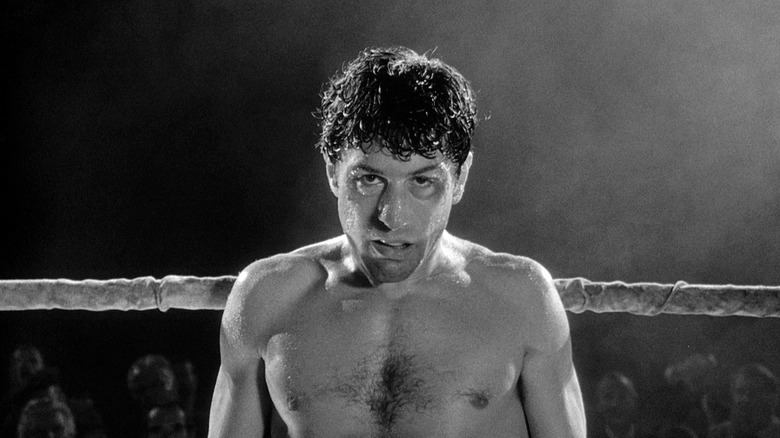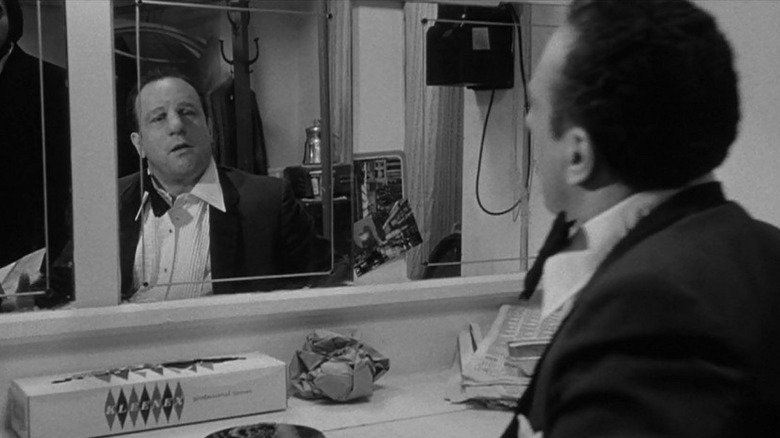Raging Bull Ending Explained: Jake LaMotta Loses It All
Directed by Martin Scorsese, "Raging Bull" is a ferocious portrait of award-winning boxer Jake LaMotta (Robert De Niro), a self-loathing tyrant who succumbs to animalistic rage and jealousy that leads to his downfall. It is a dark tale of "self-destructiveness and forsaken potential where the champion is left stripping his belt for jewels and literally beating his own head against the wall of a dark cell by the end," Joshua Meyer writes in his piece on Best Picture nominees that should have won. De Niro won an Academy Award for his transformative performance as a sculpted athlete who becomes a portly, washed-up lounge act.
Jake channels his savage energy into the ring and becomes a reigning champion, but it is not enough to keep his deep-seated insecurities from boiling over into his life. He ends up annihilating his most important relationships with his brother and his wife. Jake constantly worries that his wife Vickie (Cathy Moriarty) is having an affair with other men, including his next opponent Tony Janiro. A scuffle involving Vickie at the Copacabana with Salvy Betts (Frank Vincent), Jake's friend with mafia connections, and Jake's brother and boxing manager Joey (Joe Pesci), leads Jake to brutally interrogate Vickie about having an affair with his brother. In a chaotic and terrifying scene, the abusive Jake pummels his wife with a determined fury, even breaking the bathroom door to get to her. He walks to Joey's house with Vickie trailing behind and interrupts his brother's family meal to viciously attack him in front of his wife and children. At the end of the scene, he knocks Vickie unconscious. This rumble causes Jake and Joey's years-long estrangement.
After losing his title to Sugar Ray Robinson in 1951, Jake returns to Miami to manage a nightclub and Vickie divorces him. Jake hits rock bottom when he's arrested for having underage girls in his club and confined to a prison cage like a dangerous animal. Eventually, he returns to New York and attempts to reconnect with Joey, but their strong bond is damaged forever. The final scene takes place in 1964, where Jake sits in a backstage dressing room reciting the infamous "I coulda been a contender" monologue from "On the Waterfront" to himself in the mirror. After a stagehand tells Jake that the theatre is filling up, the former prizefighter intones "I'm the boss" while shadowboxing. This sequence leaves the audience wondering why Jake would be using those lines in his stage act and what do they mean to him?
Jake Relates to "On the Waterfront"
Jake incorporates Marlon Brando's famous monologue into his stage act because he relates to the character of Terry Malloy in "On the Waterfront." Since Jake is driven by his physical prowess, he cannot express his true feelings through his own words and must use someone else's. "On the Waterfront" is about a former boxer working as a New Jersey longshoreman who struggles to protest his corrupt union bosses. In his speech, Terry laments the success he could have had if his brother Charley had not convinced him to throw his greatest fight for his mafia connections. He bemoans:
"You don't understand! I coulda had class. I coulda been a contender. I coulda been somebody — instead of a bum, which is what I am. Let's face it. It was you, Charley."
Terry blames Charley for ruining his once-promising career. Does that sound familiar? Jake sees the parallels to his own life and condemns Joey for all of his own dismal failures. Jake sees himself as a bruised and beaten victim of his brother's cruelty. Also like Terry, Jake feels exploited by the mobsters Joey got him involved with. Both boxers were forced to sully their reputation by purposefully losing fights that they were more than capable of winning. They relinquished the control of their own strength and career to the mobsters' greed and had to deal with the unhappiness that followed.
As he does in many of his films, Scorsese uses the mirror as a compelling dramatic device. In "Raging Bull," the mirror signifies how Jake is his own worst enemy. Ironically, when facing his reflection, Jake cannot see himself for who he really is; all he can see is his own self-delusion that the entire world is against him. Jake cannot face the truth that he destroyed his relationships with his own barbaric anger.
The end title card features a Biblical quote from John 9.25 that reads:
So, for the second time, [the Pharisees] summoned the man who had been blind and said:
"Speak the truth before God. We know this fellow is a sinner."
"Whether or not he is a sinner, I do not know," the man replied.
"All I know is this: once I was blind and now I can see."
It does not signify that Jake has found redemption and recognized his faults. He is not ready to face the consequences of his own actions. Instead, it serves as a dedication to Haig P. Manoogian, Scorsese's mentor at NYU who helped him discover the power of film. Bringing Jake's sadistic story to the screen also saved Scorsese's life, forcing him to confront his drug addiction and depression and pour himself into his passion for creating cinema instead. By the end of "Raging Bull," Jake has fallen from prizefighting grace, but the has-been pugilist still presses on, shadowboxing an invisible opponent — ready to unleash the electric rage that constantly courses through him.

